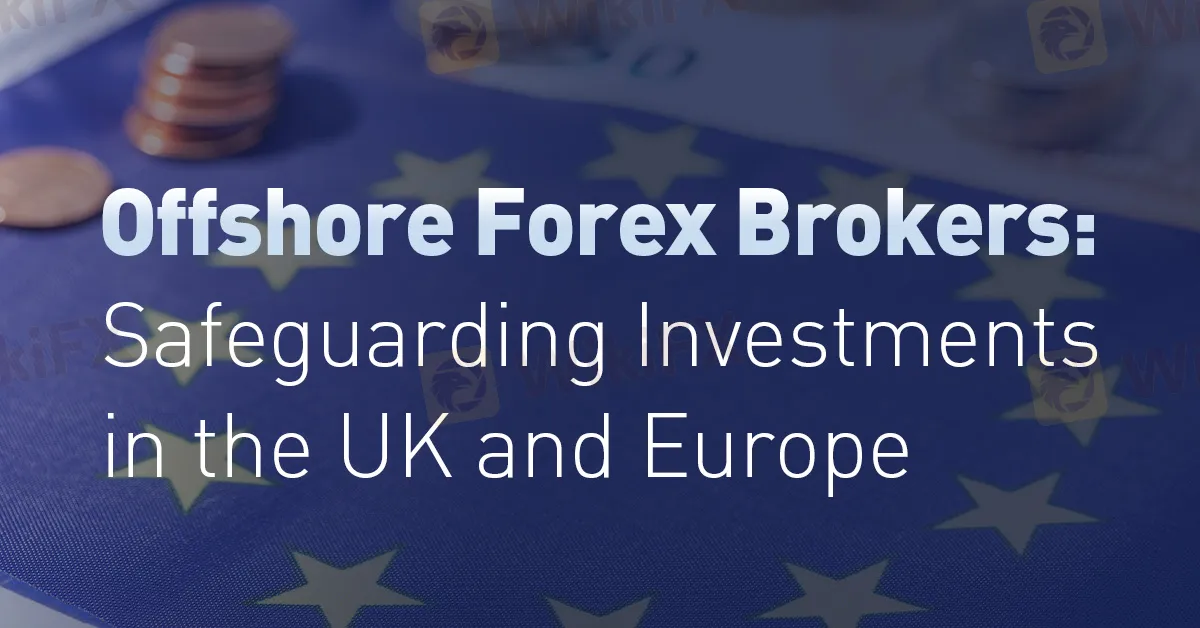简体中文
繁體中文
English
Pусский
日本語
ภาษาไทย
Tiếng Việt
Bahasa Indonesia
Español
हिन्दी
Filippiiniläinen
Français
Deutsch
Português
Türkçe
한국어
العربية
Offshore Forex Brokers: Safeguarding Investments in the UK and Europe
Abstract:In the vast landscape of Forex trading, offshore Forex brokers have emerged as a double-edged sword. While they offer diverse trading opportunities, they also present significant risks for investors, especially in the UK and Europe. Offshore brokers, operating beyond the stringent regulations of local authorities, often lack transparency and investor protection measures. Understanding the risks associated with these brokers is crucial, and having a reliable resource like WikiFX can be instrumental in safeguarding investments.

In the vast landscape of Forex trading, offshore Forex brokers have emerged as a double-edged sword. While they offer diverse trading opportunities, they also present significant risks for investors, especially in the UK and Europe. Offshore brokers, operating beyond the stringent regulations of local authorities, often lack transparency and investor protection measures. Understanding the risks associated with these brokers is crucial, and having a reliable resource like WikiFX can be instrumental in safeguarding investments.
The Appeal and Perils of Offshore Forex Brokers
Offshore Forex brokers lure investors with enticing offers such as low trading costs, high leverage, and a wide range of tradable instruments. However, these benefits come with inherent risks. Offshore brokers are not subject to the strict regulatory oversight that local brokers undergo, making them susceptible to unethical practices, lack of transparency, and potential scams. Investors dealing with offshore brokers often find it challenging to resolve disputes or seek legal recourse in case of financial irregularities.
Navigating the Offshore Dilemma: The Role of WikiFX
WikiFX stands as a beacon of transparency and investor protection in the realm of Forex trading. The platform specializes in evaluating and verifying Forex brokers, including offshore entities, providing investors with crucial information to make informed decisions. WikiFX offers a comprehensive database of broker details, including regulatory status, trading platforms, and user reviews. Armed with this knowledge, investors can differentiate between trustworthy offshore brokers and potential scams, ensuring their investments are in safe hands.
Finding WikiFX is as simple as visiting their official website at www.wikifx.com. Here, investors gain access to an extensive repository of information that can aid in navigating the complexities of the Forex market. WikiFXs intuitive platform allows users to search for brokers based on specific criteria such as regulation, trading platforms, and user ratings, enabling them to make well-informed decisions and protect their investments from offshore risks.
How WikiFX Can Help: A Subtle Advertisement
WikiFX serves as a guardian for investors seeking to engage with offshore Forex brokers. By leveraging their services, investors equip themselves with essential tools to identify reliable brokers and avoid potential scams. The platform's meticulous evaluations ensure the information provided is accurate and up-to-date, allowing investors to make secure investment choices.
Moreover, WikiFX places significant emphasis on investor education. Through informative articles, guides, and expert insights, the platform educates investors about the warning signs associated with offshore brokers, empowering them to recognize potential threats independently. By fostering awareness, WikiFX not only protects investors from scams but also imparts them with the knowledge necessary to navigate the intricate world of Forex trading securely.
In a landscape where offshore brokers can be both promising and perilous, WikiFX stands as a steadfast ally. By choosing brokers listed and verified on WikiFX, investors significantly mitigate their risks, safeguarding their investments from fraudulent practices prevalent in the offshore Forex market.
In conclusion, offshore Forex brokers pose significant risks to investors in the UK and Europe. The lack of regulatory oversight makes it crucial for investors to rely on credible sources of information. WikiFX provides users with the tools and insights needed to navigate the world of offshore Forex trading safely and confidently.
To empower yourself with knowledge and shield your investments from offshore risks, visit WikiFXs official website at www.wikifx.com. Join a community of informed investors who trust WikiFX for a safer and more secure trading experience. Make informed decisions, avoid scams, and navigate the world of offshore Forex trading with confidence.

Disclaimer:
The views in this article only represent the author's personal views, and do not constitute investment advice on this platform. This platform does not guarantee the accuracy, completeness and timeliness of the information in the article, and will not be liable for any loss caused by the use of or reliance on the information in the article.
Read more

Interactive Brokers Expands Crypto Trading with Solana, XRP, Cardano, and Dogecoin
Interactive Brokers adds Solana, XRP, Cardano, and Dogecoin to its platform, enabling U.S. and U.K. clients to trade crypto 24/7 with low fees.

Fidelity Investments Explores Stablecoin Innovation in Digital Assets Sector
Fidelity Investments tests a stablecoin, joining major financial firms in the booming crypto sector. Discover how this impacts digital payments and blockchain adoption.

Hantec Markets Launches InsightPro: AI-Powered Real-Time Trading Signal Tool for Traders
Hantec Markets introduces InsightPro, an AI-powered trading tool offering real-time market insights, signals, and analysis for better trading success.

Broker Comparison: FXTM vs XM
Choosing the right broker is a critical decision for traders. This article compares FXTM and XM based on basic information, regulatory status, leverage, trading platforms, account types, spreads and commissions, customer service, AI tools, and recent updates. We aim to present an unbiased overview so that you can choose the best broker suited to your needs.
WikiFX Broker
Latest News
Enlighten Securities Penalized $5 Million as SFC Uncovers Risk Control Failures
Why Are Financial Firms Adopting Stablecoins to Enhance Services and Stability?
Experienced Forex Traders Usually Do This Before Making a Lot of Money
Octa vs XM:Face-Off: A Detailed Comparison
When High Returns Go Wrong: How a Finance Manager Lost RM364,000
Bridging Trust, Exploring Best—WikiEXPO Hong Kong 2025 Wraps Up Spectacularly
Interactive Brokers Expands Crypto Trading with Solana, XRP, Cardano, and Dogecoin
Fidelity Investments Explores Stablecoin Innovation in Digital Assets Sector
Why More People Are Trading Online Today?
SEC Ends Crypto.com Probe, No Action Taken by Regulator
Currency Calculator







